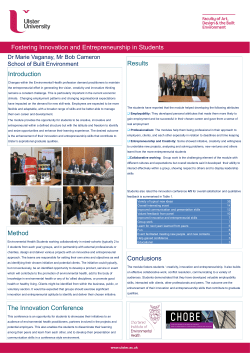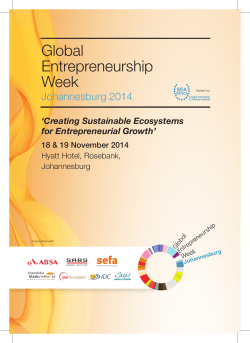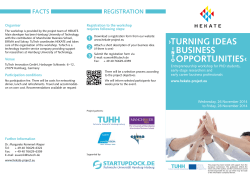
David Levin and The Capital Group
Case Study Teaching Notes David Levin and The Capital Group Introduction This case study was developed for a final year entrepreneurship module developed as an option for students pursuing hospitality, tourism and leisure management programmes who have already studied marketing and finance as pre-requisites. Students from other disciplines in the university have also opted to study the module and it is considered to be suitable as a versatile vehicle for illustrating aspects of entrepreneurship for students of various backgrounds and stages of study. As used, the case formed the basis of one two-hour seminar class almost at the end of the entrepreneurship course. The case charts the development of an entrepreneurial business involved in hotel and food service businesses over two generations. It is presented in five separate mini cases. Consequently, there is also the possibility to draw upon it over a period of weeks, using one of the stages to stimulate shorter discussion of an aspect of entrepreneurship in a more focussed way, which is integrated into a more formal teaching session. All information in the case has been provided directly by David and Joe Levin, via a series of interviews. They have been particularly open about the financial performance of the Capital Group and its current new initiatives. Students can be encouraged to supplement their case knowledge through investigation of the Capital Group website, www.capital-london.net. The authors also draw attention to a previous case study and video ‘They said “Don’t do it”’ that focused on David Levin through to the time of his development of the Capital Hotel. The case and video was prepared by Professor Alison J Morrison at the Scottish Hotel School. alison.j.morrison@strath.ac.uk Case overall learning outcomes After reflecting on and discussing the case, students will:• Consider entrepreneurial characteristics, motivations and expertise and how these affected the ongoing development of the Capital Group. • Evaluate the key features of different concepts developed by the Capital Group • Consider how principles and practices of entrepreneurial management impact on operations and business performance. Hospitality, Leisure, Sport and Tourism Network 1 Case Study Teaching Notes – David Levin and The Capital Group Suggested use in-class One two-hour session For one two-hour workshop session, students can be given specific issues to address, in order to provide a focus for discussion. • Evaluate David Levin’s entrepreneurial characteristics, motivations and expertise. • Consider Joe Levin’s personal development in preparation for his role in the Capital Group. Are there lessons for you here? Links to Entrepreneurship Theory Both of the above issues can be clearly related to entrepreneurship theory relating to the development of entrepreneurial human capital. There are numerous opportunities for engagement with the ‘born and made’ debate and the role of general traits, as well as relevant operational and management expertise. Discussion can also be related to classifications of different types of entrepreneurs; the stages of business growth, and the key entrepreneur-related factors that have enabled the Capital Group to emerge as a high growth business. Entrepreneurial motivation can also be considered in relation to the ongoing development of a business that could have been sold for many millions several times over during the past few years. • Consider the key elements contributing to the success of The Royal Oak, the Capital Hotel and the Greenhouse. • What were the key features contributing to the success of The Peoples Palace? Should the Capital Group bid to continue with it, given the financial results? Links to Entrepreneurship Theory The case provides significant scope to engage with entrepreneurship theory relating to environment for enterprise; barriers to entry; support; risk; entrepreneurial flexibility in relation to concept development; entrepreneurial teams; serial entrepreneurship, as well as characteristics and qualities such as determination, perseverance, persuasiveness, creativity, opportunity-spotting and serendipity. Financial management issues can also be addressed. Both capital investment and return on capital can be considered in relation to the ventures, and operational performance can be analysed and related to the business cycle and entrepreneurial timing. Hospitality, Leisure, Sport and Tourism Network 2 Case Study Teaching Notes – David Levin and The Capital Group • Critically evaluate Joe’s development of the Capital Group and his approach to business development. Take a look at the Capital Group web site to inform your judgement. www.capital-london.net Links to Entrepreneurship Theory This provides a link to issues relating to family businesses and succession as well as considering strategic development in relation to the Capital Group’s particular expertise and the approach taken. Ideas relating to added value created through strategic alliances can be explored. Will the Group continue to be successful following this development format? Use over several weeks The case unfolds in a way that is compatible with a course design that starts off with consideration of entrepreneurs and entrepreneurship and then progresses to consideration of the business environment, opportunity recognition and entrepreneurial business management. Part 1 - The First Steps Focus: entrepreneurial motivations, characteristics and expertise, entrepreneurial human capital (can also be used in relation to part 3). Part 2 - Moving On Focus: entrepreneur classifications, environment for enterprise. serial entrepreneurship, opportunity-spotting, risk and Part 3 - The Heir Apparent Focus: issues relating to family businesses and the stages of business growth (can also be used along with part 1). Part 4 - New Challenges – The People’s Palace Focus: concept development, operational management and financial performance. Part 5 - What does the future hold? Focus: strategic development, core expertise and the business environment. Hospitality, Leisure, Sport and Tourism Network 3
© Copyright 2025













